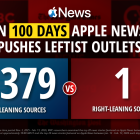Payment processing site PayPal seems to have aligned itself with the leftist censorship tactics of its Big Tech counterparts.
Over the past few months, individuals and users such as Gays Against Groomers, UsForThem and the Free Speech Union said PayPal shut down their accounts.
In this week’s episode of CensorTrack with Paiten, we took a deep dive into the ambiguous world of PayPal’s bias and censorship.
PayPal often left censored groups with no specified reason and sometimes without their money.
In addition to shutting down accounts, the digital wallet also has the nasty habit of freezing funds. Why? Because it can.
When users sign up for PayPal and agree to the User Agreement, they give the company permission to terminate their accounts and withhold their money “for any reason and at any time.”
Lack of access to funds can devastate an organization or business.
Small business owners James and Ginger Staake said they learned this firsthand. The couple sells custom-made American flags. The couple said PayPal shut down their business account last year, preventing them from accessing thousands of dollars in much-needed capital.
The couple said it took over “11 months” and the threat of legal action for Your American Flag Store to get its money back. The small family business added that it still deals with the impact of PayPal’s censorship.
After PayPal received backlash for its financial bullying, the payment processor updated its Acceptable Use Policy.
The platform appears to have doubled down on its vague, anti-free speech policies.
Effective Nov. 3, PayPal will expand its list of prohibited activities. The updated policy prohibits users from using PayPal for activities that:
“[I]nvolve the sending, posting, or publication of any messages, content, or materials that, in PayPal’s sole discretion, (a) are harmful, obscene, harassing, or objectionable … (e) depict, promote, or incite hatred or discrimination of protected groups or of individuals or groups based on protected characteristics (e.g. race, religion, gender or gender identity, sexual orientation, etc.) … (g) are fraudulent, promote misinformation … or (i) are otherwise unfit for publication.”
How does PayPal define “misinformation,” or “objectionable” content? If the past is any indication, PayPal appears to use this kind of vague language as a shield for censorship.
We must call on Big Tech companies and payment processors like PayPal to mirror the First Amendment, provide transparency, clarity on hate speech and equal footing for conservatives.
To stay updated on free speech news and to help hold Big Tech accountable, visit CensorTrack.org and follow MRC Free Speech America’s social media channels:
Also, check out our previous episodes:
- YouTube CEO Claims Platform Promotes Free Speech
- CCP-Tied TikTok Triggered by Free Speech
- Zuckerberg Says FB Censored Hunter Biden Bombshell After FBI Pressure
- And more!
Conservatives are under attack. If you have been censored, contact us at the MRC Free Speech America contact form, and help us hold Big Tech accountable.









